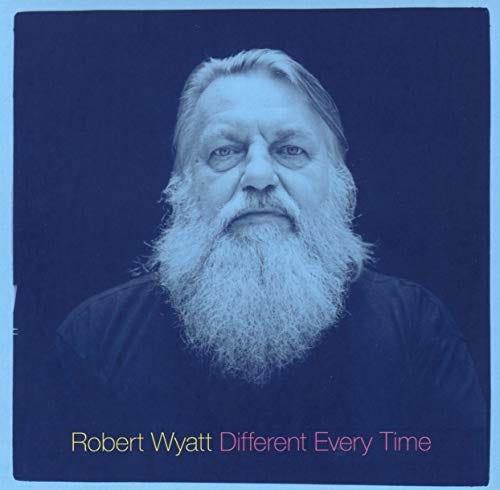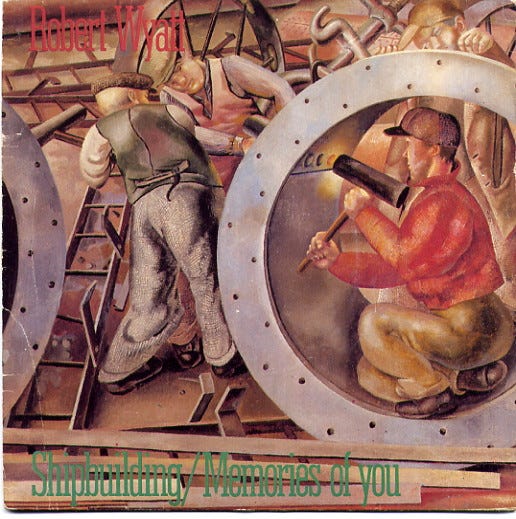“Shipbuilding” by ROBERT WYATT
What's the cost of an aircraft carrier?
Is it worth it?
The Top of the Pops producer didn’t want the wheelchair onstage. Robert Wyatt had been invited to perform on BBC One’s long-running music chart television show thanks to his cover of The Monkees “I’m A Believer,” which hit #29 on the pop charts in 1974. His wheelchair, however, was considered “not suitable for family viewing”; it was suggested that the paraplegic be sat in an armchair. Wyatt lost his temper (as well as future invitations to perform on the show) but kept his wheelchair, from which he sang in front of Pink Floyd’s Nick Mason on drums.
Wyatt had been the drummer and a vocalist in Soft Machine, a band at the center of the ‘60s Canterbury scene’s fusion of psychedelic prog rock and improvisational jazz. The group played with Pink Floyd, whose own psyche/prog sound came from an opposite direction, and toured the U.S. opening for The Jimi Hendrix Experience. It was on that tour, hanging with Mitch Mitchell and Noel Redding, that Wyatt’s casual drinking grew into something much more serious. At a party in mid 1973, a drunk Wyatt fell from a London fourth floor window; his injuries paralyzed him from the waist down. He credits the accident with saving his life. He wrote the music for his first proper solo album, Rock Bottom, in his head while lying in a hospital bed.
Wyatt’s “Shipbuilding” was re-released in 1983 on the first anniversary of the Falklands War. The song was written by Clive Langer with lyrics by Elvis Costello (“the best lyrics I’ve ever written”) with the idea of releasing four versions of the song, each with a different singer, together as an EP. After the Costello-produced recording session of Wyatt’s vocals, however, they decided that they had the definitive version of the song and scrapped plans for the EP. The single was released two months after the end of the 10 week conflict that killed 649 Argentine and 255 British military and three Falkland Islanders. It failed to chart, but was a favorite of David Bowie and legendary BBC One DJ John Peel, who had the song as #2 on his 1982 countdown. Wyatt’s wistful tone better fit the national mood the following year, and an ambling song about work returning to shipyards in exchange for sending sons to war hit #35 on the UK charts.
“Everybody’s got an equally good voice. Just like everybody’s got two arms and two legs,” Wyatt said in a 1974 interview1, a year after being paralyzed. “It’s just a matter of using it.” He uses his reedy voice and matter-of-fact but very clever phrasings to accentuate the poignancy in a song’s lyrics, whether the song is an original shaped around his wife Alfie Benge’s poetry or a Monkees cover. Singing from the perspective of a skilled laborer torn between the dignity of work and what the return of that work will mean to the families of those called to war, Wyatt makes “Shipbuilding” a gut punch from the beginning:
Is it worth it?
A new winter coat and shoes for the wife
And a bicycle on the boy's birthday
In that 1974 interview quoted above, New Musical Express writer Charles Shaar Murray says of Rock Bottom that “it’s an easy one to listen to and a hard one to come to terms with.” That’s true here as well. The instrumentation is quiet and intimate, just pensive piano, the jazzy rattling of a snare, and the low thump of double bass mirrored by a kick drum2. Wyatt’s voice strains as the melody climbs to the ceiling of his range, but he isn’t pushing — it’s as if the notes are being pulled out of him. Costello’s own version of “Shipbuilding” on his Punch the Clock album, featuring trumpeter Chet Baker, gives it a sense of torchy, cabaret-jazz drama; Elvis really sings the hell out of the song. Wyatt is singing what the song means.
It's just a rumor that was spread around town
A telegram for a picture postcard
Within weeks they'll be reopening the shipyard
And notifying the next of kin
Once again.
It's all we're skilled in
We will be shipbuilding.
It’s partly its deliberate pace, but listening to Wyatt’s “Shipbuilding” can feel like descending stairs on an icy night. Not in the sense that it’s precarious — your emotional slide is a foregone conclusion from the opening words — but in that it demands special attention to what you’d otherwise take for granted, like the labor of others. Workingmen’s voices are so often rendered as deep and gruff, manifestations of calloused hands. Wyatt’s is high and delicate. The fragile humanity he gives “Shipbuilding” takes it far beyond the shipyards of Merseyside and Newcastle or two disputed islands in the South Atlantic. He brings it home.
15 Song Playlist
“Shipbuilding,” with some Wyatt songs, both solo and with bands Soft Machine and Matching Mole, plus Wyatt collaborations. At the end, there’s Elvis Costello’s version of “Shipbuilding” and his answer song from an Argentine perspective.
That Top of the Pops Performance
Thank You
Thank you for reading and clicking the ‘like’ heart. If could take the time to share The Best Song Ever (This Week) with a few friends who might enjoy it, please do. Connecting to people through music seems more important than ever.
Scott
https://www.theguardian.com/music/2015/jan/28/robert-wyatt-70th-birthday-prog-rock-pioneer-1974-nme-interview
Costello is in the video playing guitar. Maybe you can hear it? Note: The Attractions keyboardist Steve Nieve plays on both Costello’s and Wyatt’s version of the song.



